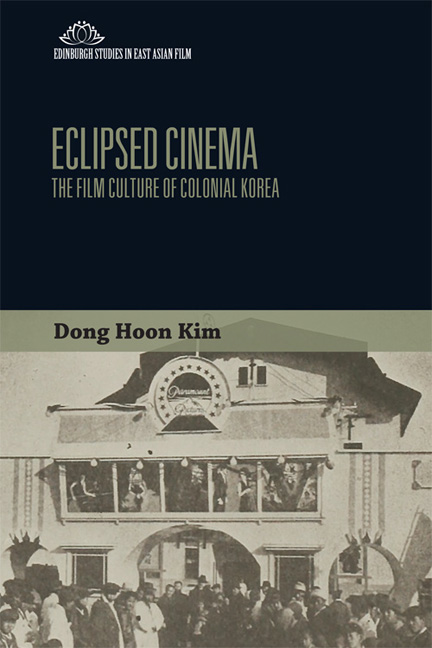Book contents
- Frontmatter
- Contents
- List of Figures
- Acknowledgements
- Introducing Joseon Cinema: the Question of Film History and the Film Culture of Colonial Korea
- 1 The Beginning: Towards a Mass Entertainment
- 2 Joseon Cinema, Cinematic Joseon: on Some Critical Questions of Joseon Cinema
- 3 Migrating with the Movies: Japanese Settler Film Culture
- 4 Colonial Film Spectatorship: Nationalist Enough?
- 5 Film Spectatorship and the Tensions of Modernity
- Conclusion: Integrating into the Imperial Cinema
- Notes
- Appendix
- Bibliography
- Index
5 - Film Spectatorship and the Tensions of Modernity
Published online by Cambridge University Press: 03 January 2018
- Frontmatter
- Contents
- List of Figures
- Acknowledgements
- Introducing Joseon Cinema: the Question of Film History and the Film Culture of Colonial Korea
- 1 The Beginning: Towards a Mass Entertainment
- 2 Joseon Cinema, Cinematic Joseon: on Some Critical Questions of Joseon Cinema
- 3 Migrating with the Movies: Japanese Settler Film Culture
- 4 Colonial Film Spectatorship: Nationalist Enough?
- 5 Film Spectatorship and the Tensions of Modernity
- Conclusion: Integrating into the Imperial Cinema
- Notes
- Appendix
- Bibliography
- Index
Summary
After buying tickets, we headed directly towards the main exhibit. When we passed by four or five people coming out from the exhibition, we heard them telling a joke aloud, ‘Those two Korean animals displayed at the main hall were utterly funny’, and then they walked on. When we reached a certain spot where a dim daylight was falling, we saw a Korean man with a traditional hairdo and outfit, sitting on a chair in one corner. In the other corner, a lady was sitting on a chair, and she wore a long Korean skirt with which she completely covered her head leaving only eyes exposed. A friend of mine immediately turned pale, sighed, and deplored, ‘They are the two Korean animals those Japanese talked about’. Oh … alas!
This chapter opens with this rather peculiar anecdote recorded by a group of Korean college students in Tokyo after their visit to the Tokyo Industrial Exposition (1907) because the unusual encounter between two different groups of Koreans on the opposite sides of a gaze emblematically exposes the essentially conflicting nature of Korea's overall experience of modernity. Since The Great Exhibition (1851), the first international-scale exposition held in London, the world's fairs and expositions were among the most popular cultural features in the latter half of the nineteenth century and throughout the early twentieth century in the West. They served primarily to celebrate the great achievements of Western modernisation and imperialism by way of exhibiting its technological and scientific achievements, as well as the actual bodies of ‘Others’ from the ‘uncharted’ territories it had conquered. Imperial Japan not only participated in the fairs and expositions of the West in order to ‘demonstrate its place among the powers of the world’ but borrowed the imperialist politics of the world's fairs and expositions from the West to hold its own versions of them. Japan's expositions functioned similarly to its Western counterparts, aiming to commemorate Japan's imperial expansions and also to display its differences from other Asian countries.
- Type
- Chapter
- Information
- Eclipsed CinemaThe Film Culture of Colonial Korea, pp. 184 - 228Publisher: Edinburgh University PressPrint publication year: 2017



